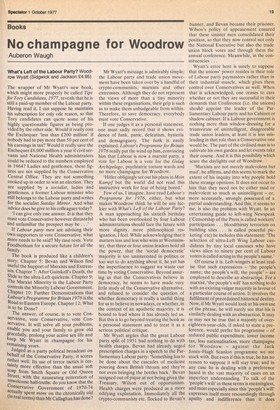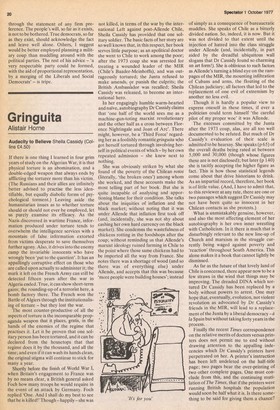Books
No champagne for Woodrow
Auberon Waugh
What's Left of the Labour Party? Woodrow Wyatt (Sidgwick and Jackson £4.95) The wrapper of Mr Wyatt's new book, which might more properly be called Tips for Tory Candidates, 1977, reveals that heds still a paid-up member of the Labour party. Having read it, I can suppose he maintains his subscription for only one reason, so that Tory candidates can quote some of his highly questionable figures as being provided by the other side. Would it really cost the Exchequer 'less than 1200 million' if nobody had to pay more than 50 per cent of his earnings in tax? Would it really save the Exchequer £6,000 million a year if civil servants and National Health administrators could be reduced to the numbers employed in 1964? Ladies and gentlemen, these figures are not supplied by the Conservative Central Office. They are not something cooked up in order to win an election. They are supplied by a socialist, ladies and gentlemen, a former Labour minister who still belongs to the Labour party and writes for the socialist Sunday Mirror. And what advice does he give to his colleagues today?
'I can give only one answer. It is that they must vote Conservative however distasteful and unfamiliar the prospect may be .
If Labour party men are advising their own supporters to vote Conservative, what more needs to be said? My case rests. Vote Foodbotham for a secure future for all the family.
The book is produced like a children's story: Chapter 5: Bevan and Wilson find useful the Support of Marxists and Extremists. Chapter 7: After Gaitskell's Death, the Slide to the ultra-Left quickens. Chapter 9: The Marxist Minority in the Labour Party controls the Minority Labour Government. Chapter 10: Further Demonstrations that Labour's Programme for Britain 1976 is the Road to Eastern Europe. Chapter 12: What is to be Done?
The answer, of course, is to vote Conservative, vote Conservative, vote Conservative. It will solve all your problems, enable you and your family to grow old gracefully, prolong your active sex life and keep Mr Wyatt in champagne for his remaining years. Judged as a party political broadcast on behalf of the Conservative Party, it scores rather well. Its use of terror tactics is certainly more effective than the usual soft soap from Smith Square or Old Queen Street, with the nauseating reiteration of unwelcome half-truths: do you know that the Conservative Government of 1970-74 actually spent more on the chronically old (in real terms) than Mr Callaghan has done? Mr Wyatt's message is admirably simple; the Labour party and trade union movement have been taken over by a handful of crypto-communists, marxists and other extremists. Although they do not represent the views of more than a tiny minority within these organisations, their grip is such as to make them unbudgeable from within. Therefore, to save democracy, everybody must vote Conservative.
If one judges it as a personal statement, one must sadly record that it shows evidence of funk, panic, defeatism, hysteria and demagoguery. The funk is easily explained. Labour's Programme for Britain 1976 really put the wind up him, convincing him that Labour is now a marxist party, a vote for Labour is a vote for the Gulag Archipelago, psychiatric torture wards and no more champagne for Woodrow.
'Hitler obligingly set out his plans in Mein Karnpf but the world did not read this instructive work for fear of being bored.'
Few of us, I imagine, have read Labour's Programme for 1976, either, but what makes Woodrow think he will be any luckier with What's Left of the Labour Party? A man approaching his sixtieth birthday who has been overlooked by four Labour administrations should face the future with more dignity, more philosophical resignation, I feel. While acknowledging that it matters less and less who wins at Westminster, that three or four union leaders hold all the power, that the 'social democratic' majority is too uninterested in politics or too wet to do anything about it, he yet has the impertinence to suggest we waste our time by voting Conservative. Beyond assuring us that the Conservatives believe in democracy, he seems to have made very little study of the Conservative alternative, and refused to consider the question of whether democracy is really a useful thing for us to believe in nowadays, or whether, in the context of an apathetic majority, it is bound to lead where it has already led us. But this is to go beyond treating the book as a personal statement and to treat it as a serious political critique.
Mr Wyatt argues that the great Labour party split ol 1951 had nothing to do with health charges. Bevan had already urged prescription charges in a speech to the Parliamentary Labour party: 'Something has to be done about the cascades of medicine pouring down British throats and they're not even bringing the bottles back.' Bevan resigned out of pique at not being given the Treasury, Wilson out of opportunism. Health charges were produced as a more edifying explanation. Immediately all the crypto-communists etc. flocked to Bevan's banner, and Bevan became their prisoner. Wilson's policy of appeasement ensured that these sinister men consolidated their position, so that they now control not only the National Executive but also the trade union block votes and through them the annual conference. Meanwhile, in the constituencies . .
Wyatt's error here is surely to suppose that the unions' power resides in their role of Labour party paymasters rather than in their industrial muscle, which gives them control over Conservatives as well. When that is acknowledged, one ceases to care whether or not they are successful in their demands that Conference (i.e. the unions) shotild appoint the leader of the Parliamentary Labour party and his Cabinet or shadow cabinet. If a Labour government is nothing more than window-dressing for a triumvirate of unintelligent, disagreeable trade union leaders, at least it is less misleading in that role than a Conservative one would be. The part of the civilised man is to cultivate his own garden and let events take their course. And it is this possibility which scare the daylights out of Woodrow.
'Marxists are not merely malevolent but mad', he affirms, and this seems to mark the extent of his inquiry into why people hold these strange opinions. It does not occur to him that they need not be either mad or malevolent so much as unintelligent — or, more accurately, strongly possessed of a partial understanding. And this, it seems to me, is also the problem with Wyatt. In an entertaining guide to left-wing Newspeak ('Censorship of the Press is called workers' participation . . bloodthirsty terrorism on building sites . . . is called peaceful picketing' etc) he includes this statement: 'The selection of ultra-Left Wing Labour candidates by tiny local caucuses who have views alien to ninety per cent of Labour voters is called acting in the people's name.'
Of course it is. Left-wingers at least realise that such expressions — 'the people's name; the people's will; the people' — are employed to describe an abstractign. For a marxist, 'the people's will' has nothing to do with an existing vulgar majority in favour of a particular course of action. It involves the fulfilment of preordained historical destiny. Now, if Mr Wyatt would look at his own use of the phrase, he will surely see that his is similarly dealing with an abstraction. it may or may not be true that a majority of overeighteen-year-olds, if asked to state a preference, would prefer his programme — of reduced public expenditure, lower income tax, less nationalisation, more champagne for Woodrow — against the Jack Jones—Hugh Scanlon programme we are stuck with. But even if this is true, he has no reason to suppose it will stay true; and in any case he is dealing with a preference based in the vast majority of cases on an imperfect understanding. To talk of the 'people's will' in these terms is meaningless, and most especially since this 'people's will' expresses itself more resoundingly through apathy and indifference than it does through the statement of any firm preference. The people's will, so far as it exists, is not to be bothered. True democrats, so far as they exist, should acknowledge the fact and leave well alone. Others, I suggest would be better employed planning a military coup than muddling around with the political parties. The rest of his advice — 'a very respectable party could be formed, with the aid of proportional representation, by a merging of the Liberals and Social Democrats' — is tripe.



































 Previous page
Previous page